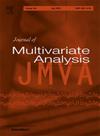Inference for overparametrized hierarchical Archimedean copulas
IF 1.4
3区 数学
Q2 STATISTICS & PROBABILITY
引用次数: 0
Abstract
Hierarchical Archimedean copulas (HACs) are multivariate uniform distributions constructed by nesting Archimedean copulas into one another, and provide a flexible approach to modeling non-exchangeable data. However, this flexibility in the model structure may lead to over-fitting when the model estimation procedure is not performed properly. In this paper, we examine the problem of structure estimation and more generally on the selection of a parsimonious model from the hypothesis testing perspective. Formal tests for structural hypotheses concerning HACs have been lacking so far, most likely due to the restrictions on their associated parameter space which hinders the use of standard inference methodology. Building on previously developed asymptotic methods for these non-standard parameter spaces, we provide an asymptotic stochastic representation for the maximum likelihood estimators of (potentially) overparametrized HACs, which we then use to formulate a likelihood ratio test for certain common structural hypotheses. Additionally, we also derive analytical expressions for the first- and second-order partial derivatives of two-level HACs based on Clayton and Gumbel generators, as well as general numerical approximation schemes for the Fisher information matrix.
超参数化层次阿基米德copulas的推理
层次化阿基米德copula (Hierarchical Archimedean copula, HACs)是由阿基米德copula相互嵌套而成的多元均匀分布,为不可交换数据的建模提供了灵活的方法。然而,当模型估计过程没有正确执行时,模型结构中的这种灵活性可能导致过度拟合。在本文中,我们从假设检验的角度研究了结构估计问题,更广泛地研究了简约模型的选择问题。迄今为止,缺乏对HACs结构假设的正式检验,这很可能是由于其相关参数空间的限制,阻碍了标准推理方法的使用。基于先前针对这些非标准参数空间开发的渐近方法,我们为(潜在的)过参数化HACs的最大似然估计提供了渐近随机表示,然后我们使用它来制定某些常见结构假设的似然比检验。此外,我们还推导了基于Clayton和Gumbel发生器的两能级HACs的一阶和二阶偏导数的解析表达式,以及Fisher信息矩阵的一般数值近似格式。
本文章由计算机程序翻译,如有差异,请以英文原文为准。
求助全文
约1分钟内获得全文
求助全文
来源期刊

Journal of Multivariate Analysis
数学-统计学与概率论
CiteScore
2.40
自引率
25.00%
发文量
108
审稿时长
74 days
期刊介绍:
Founded in 1971, the Journal of Multivariate Analysis (JMVA) is the central venue for the publication of new, relevant methodology and particularly innovative applications pertaining to the analysis and interpretation of multidimensional data.
The journal welcomes contributions to all aspects of multivariate data analysis and modeling, including cluster analysis, discriminant analysis, factor analysis, and multidimensional continuous or discrete distribution theory. Topics of current interest include, but are not limited to, inferential aspects of
Copula modeling
Functional data analysis
Graphical modeling
High-dimensional data analysis
Image analysis
Multivariate extreme-value theory
Sparse modeling
Spatial statistics.
 求助内容:
求助内容: 应助结果提醒方式:
应助结果提醒方式:


